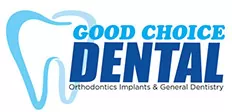they are called impacted wisdom teeth – and they can present with a number of problems if they are not managed. At Good Choice Dental we are committed to offering our patients a comfortable and affordable wisdom tooth removal procedure.
What Are The Wisdom Teeth And Why Must They Be Removed?
The wisdom teeth are a third set of molars that are there for back up. For most people they only emerge between the ages of 17 and 25 but by that stage, the rest of the teeth in your mouth are quite big and occupy most of your jaw.
In around 85% of people, the wisdom teeth need to be removed because there isn’t enough space to accommodate them. When this happens they are called impacted wisdom teeth.
What Can Impacted Wisdom Teeth Cause?
Impacted wisdom teeth can’t be left unmanaged and can lead to the following complications if they are not treated
- Problems with dental hygiene because the area is difficult to clean
- Pain, discomfort and swelling
- Gum disease
- Tooth decay
- Damage to the adjacent teeth
- The development of a cyst around the wisdom tooth
Of course if your wisdom are not impacted, and do not look like they will present with any future problems they will not need to be removed. Your dental practitioner will take x-rays of your jaws to see how your wisdom teeth are erupting and if they could be troublesome.
Impacted Wisdom Teeth
There are different ways and directions in which wisdom teeth can become impacted:

- Sometimes the wisdom tooth grows at an angle towards the tooth next to it (your second molar)
- Sometimes the wisdom tooth grows at an angle facing the back of your mouth
- Sometimes the wisdom tooth can grow at a right angle with your other teeth, in an almost horizontal position
- Sometimes the wisdom tooth can grow in a straight line but it does not emerge from the jawbone.
When this takes place, your impacted wisdom teeth need to be surgically removed. And even though so many adults have an innate fear of wisdom tooth extraction, it is actually a very common procedure that usually goes successfully.
How Does The Wisdom Tooth Extraction Procedure Work?
Your wisdom tooth extraction procedure will depend on the number of wisdom teeth that are going to be removed and the complexity of your extraction. Based on your procedural needs, your dentist will determine which anaesthetic to use. Your dentist will choose between:
- Local anaesthetic
- Sedation anaesthetic
- General anaesthetic
Once anaesthetic has been administered your dentist will:
- Make an incision into your gum and jawbone in order to access the bone underneath it
- Remove any bone that is blocking the tooth’s root
- Remove your wisdom teeth. Sometimes the tooth might need to be divided into smaller pieces, if it is in an area that is hard to access
- Clean the site to ensure all debris has been removed from the tooth and bone
- Stitch the site up (in some cases)
What Can You Expect After Your Wisdom Tooth Extraction?
Most patients are pleasantly surprised at how quickly they recover after an impacted wisdom tooth extraction. Once the anaesthetic has worn off, you may feel some tenderness and bruising at the site of the extraction as well as a little bleeding. Your dentist will give you some gauze to bite down onto, in order to slow down the bleeding.
What To Do After Your Extraction
Most pain, bruising and tenderness is mild and can be managed with over-the-counter medication. Your dentist will give you hygiene instructions, but usually recommends you do not brush or rinse for 24 hours after the extraction. In addition, you should also avoid very hot or cold beverages, and not chew on the side of your mouth that your tooth was extracted from.
This is to ensure that you do not dislodge the blood clot that forms over the site of the extraction, which would result in a very painful condition called dry socket.
Once the first 24 hours have passed, you are usually allowed to resume brushing, and you will be able to rinse with salt water to keep your mouth clean.
Avoid alcohol, sodas and caffeinated drinks in the hours after your surgery, but do make sure you rehydrate with lots of water after your anaesthetic. Stick to soft foods. Also avoid tobacco products and smoking, at least for 72 hours after surgery.
Still have concerns about impacted wisdom teeth? Please contact our practice to speak to a professional: (02) 8203 8760.




Recent Comments